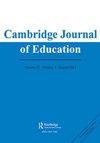Endogenous assets-mapping: a new approach to conceptualizing assets in order to understand young people’s capabilities and how these relate to their desired educational outcomes in disadvantaged neighbourhoods
IF 1.5
3区 教育学
Q2 EDUCATION & EDUCATIONAL RESEARCH
引用次数: 0
Abstract
ABSTRACT Asset-based approaches to public service reform suggest a need for policymakers to shift attention from ‘fixing’ the perceived deficits of disadvantaged neighbourhoods, to recognising and building on the resources, or assets, they hold. However, these approaches have also been critiqued for interpreting assets so broadly that they effectively become meaningless, or so narrowly that they perpetuate deficit views. To counter these tendencies, a new conceptually and methodologically robust endogenous assets-mapping approach is proposed. This has been designed to enable nuanced insights into the assets young people living in disadvantaged neighbourhoods may draw upon to pursue positive educational and wider life outcomes. The approach’s utility is illustrated through the case of Ayesha, a 14-year-old student with a difficult relationship with school. The paper concludes that an endogenous assets-mapping approach can help to generate more positive narratives for vulnerable learners living in disadvantaged neighbourhoods than schooling may typically enable.内生资产映射:一种概念化资产的新方法,以了解年轻人的能力,以及这些能力与他们在弱势社区所期望的教育成果之间的关系
摘要基于资产的公共服务改革方法表明,政策制定者需要将注意力从“修复”弱势社区的赤字转移到承认和利用他们所拥有的资源或资产。然而,这些方法也因对资产的解释过于宽泛而受到批评,以至于它们实际上变得毫无意义,或者过于狭隘而使赤字观点永久化。为了应对这些趋势,提出了一种新的概念和方法上稳健的内生资产映射方法。这是为了让人们能够细致入微地了解生活在弱势社区的年轻人可能利用的资产,以追求积极的教育和更广泛的生活成果。这种方法的实用性通过14岁的学生Ayesha的案例得到了说明,她与学校的关系很困难。该论文的结论是,内生资产映射方法有助于为生活在弱势社区的弱势学习者创造比学校教育通常更积极的叙事。
本文章由计算机程序翻译,如有差异,请以英文原文为准。
求助全文
约1分钟内获得全文
求助全文
来源期刊

Cambridge Journal of Education
EDUCATION & EDUCATIONAL RESEARCH-
CiteScore
5.30
自引率
4.30%
发文量
35
期刊介绍:
Cambridge Journal of Education publishes original refereed articles on all aspects of education, with a particular emphasis on work that contributes to a shared understanding amongst academic researchers, theorists, practising teachers, policy-makers and educational administrators. The journal also welcomes the submission of systematic review articles that summarise and offer new insights into specific areas of educational concern. With a wide international readership, Cambridge Journal of Education publishes contributions drawn from different educational systems and cultures enabling continued in-depth discussion of global educational theory, policy and practice. The journal’s Special Issue programme encourages and stimulates focused discussion and engagement with significant themes and responses to topics raised by readers and contributors. Cambridge Journal of Education welcomes proposals for future editions.
 求助内容:
求助内容: 应助结果提醒方式:
应助结果提醒方式:


